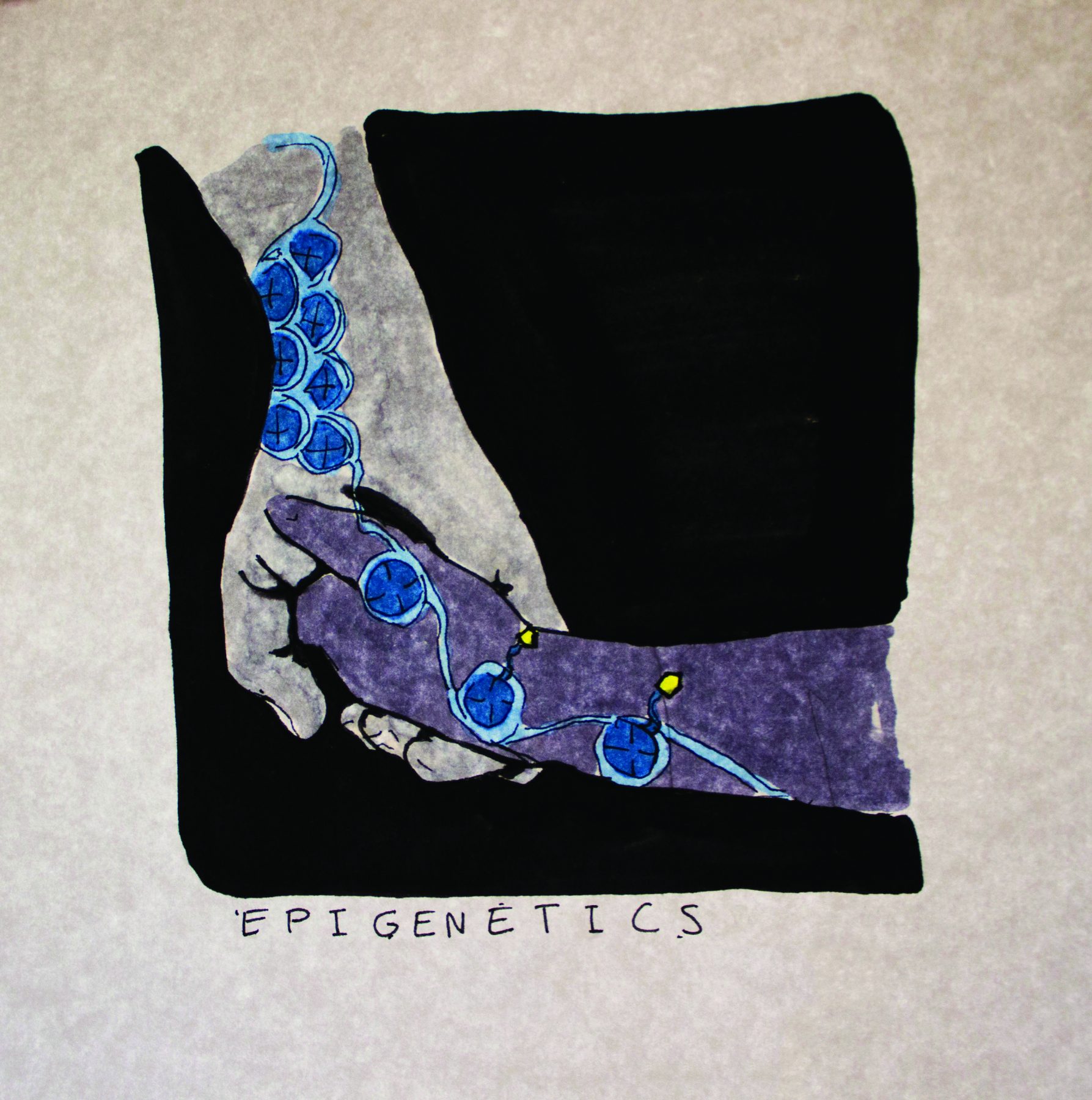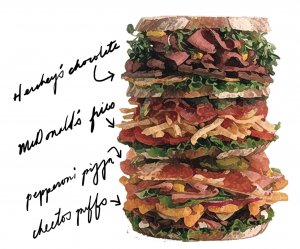In the last decade, findings within epigenetics have been generating big waves far beyond scientific circles. It’s fairly easy to understand why. But, the moral discussions that have evolved from epigenetics and the public reaction to some of hotter topics can include a eugenic edge that echoes some of the most dangerous sentiments of the 20th century.
Broadly put, epigenetics is the study of heritable changes in mechanisms for gene expression. It’s worth noting, though, that exact definitions of epigenetics are debated even today. The key points are ‘heritable’ and ‘mechanisms for gene expression’.
To start with the latter, changes in mechanisms for gene expression are changes brought on by environmental factors that affect phenotypes, or physical traits, without changing the genetic code itself. This is pretty cool when you think about it: our body responds to changes such as those of diet, stress level, exposure to toxins, and even our social environment by altering how genes are expressed. The genetic code on its own is a marvel of complexity, gene regulation a layer beyond, but the idea that our bodies can adjust how the coding within our DNA is used based on our situations and experiences is incredible.
This means a person’s environment and lifestyle can alter their gene expression, which can have significant health impacts. One example: epigenetics helps explain how the month in which you’re born helps determine what allergies you have. But not all applications are this benignly cool. The connection between our environments and epigenetic changes includes our social and personal environments, allowing us to link things like stress, racism, bullying, and socioeconomic status to our phenotypes and health risks. Compound this with patterns of injustice in how different social and racial groups are exposed to toxins and environmental hazards, and the role of environment in our health gains startling prominence.
It’s the “heritable” portion that really hits people. Epigenetic changes are always heritable between cells. As long as the change occurs in a somatic cell (not a sex cell), it can be passed down as that cell divides and replicates. The big point is that some epigenetic changes may be heritable across generations if they occur in sex cells.
Putting the two together, this means that our lifestyles and environments can change how our 25,000-something genes are expressed, at times with significant health impacts, and that these impacts can be passed down to our children. This is what makes these findings so earthshaking.
The “big waves” in the media are findings about the epigenetics relating to obesity, stress, and diabetes. Headlines on these range from the panicked and accusatory, “Curb this menace… now! New science suggests children catch obesity at birth from their parents,”to hopeful “Epigenetics and obesity: Studies Suggest We May Be Able to Alter Genetic Risk Factors.”
It’s exciting to consider the potential for positive change within epigenetics. I think it’s possible to connect this excitement to a moral impulse to improve society and quality of life. If we take the implications of epigenetics and consider its implications for the potential health impacts of our environment and our lifestyles on us and our children, it feels obligatory that we eradicate damaging environmental aspects and lifestyle choices from society.
In the article ‘Poisoning heredity’: , Maurizio Meloni asserts that epigenetics has enormous potential, but points out that we need to be careful in how epigenetics is used. He discusses recent articles and studies whose findings suggest epigenetics can lead to population-wide differences in health between social groups, and points out that their findings have the potential to be used for purposes other than promoting social justice. Scientific understanding is not an inherently moral tool, and can serve purposes either good or bad. Meloni argues, and I agree, that exalting the potential social good that can come from epigenetics while ignoring our history is unwise.
The history Meloni refers to is eugenics, which calls for an improvement of the genetics of humanity. American eugenics in the 20th century fed into existing ideas of racial inequality and ableism, as proponents of racial supremacy argued for the eradication of undesirable traits from the genepool via segregation, anti-miscegenation laws, and the sterilization of the disabled. Ideas like ‘aquired inferiority’ from the heyday of eugenics argue that, due to socially disadvantaged positions, some ‘races’ acquire undesirable traits as children inherit the results of their parents’ exposure.
Right now, the idea that we can inherit results of our parent’s environment feels counter-intuitive. But they were less so during the era of eugenics, before genetics was widely accepted. It’s possible to return to the darker points of our history with the hidden implications of the discourse on epigenetics if we forget eugenics too easily. The language we use to discuss findings in epigenetics is important in this regard. Meloni mentions an article on epigenetics in the Economist, ‘Poisoned inheritance’, whose title is unknowingly linked to the term ‘racial poisoning’ used by the eugenist Caleb Saleeby to describe population-wide impacts of alcohol within races. A lot of us know about the dangers of eugenics, but as findings in epigenetics lead to speculations about the legacy of slavery in the African American population today, it’s all the more important we remain conscious of the history of the words we use.
A form of eugenics that incorporates epigenetics would, at its most extreme, reject the rights of those with undesirable, inheritable epigenetic markers to reproduce for fear of negatively impacting future generations. Now, if we consider ‘undesirable’ as a lens through which to view all of the big epigenetic findings I’ve mentioned, this hypothetical and radical epigenetic-eugenic theory would reject the obese, the cancer-stricken, the diabetic; those exposed to toxins, to racism, to bullying, to stress; and those of low socioeconomic status.
I’ve drastically oversimplified the issue here in order to make a point. I am excited about epigenetics, but reading articles like ‘Curb this menace…’, which uses phrases like “some vices may be hardcoded into the genes at birth,” I worry that the use of moral language implies children of certain parents are ‘damaged’ epigenetically. The key point to consider as epigenetic findings continue to flood the media is that epigenetic “damage,” such as adverse health impacts caused by the environment, cannot be viewed as inferior. ‘Curb this menace…’ follows the general trend of positivity in epigenetics by pointing out that epigenetic changes are theoretically reversible, so the lifestyle choices of children can ‘reverse’ those of their parents. But potential for findings in epigenetics to inform public policy and our understanding of environmental and social injustices makes it especially important that we not only talk about how epigenetics can help us harness our health through our environment, but also where to draw the line on the moral judgements we make regarding inheritance of epigenetic markers.
I’m not saying that we should stay away from epigenetics. On the contrary, I think we should dive into this incredibly exciting field, and multidisciplinary discussion (provided that the information is translated accurately between disciplines) on this topic holds huge potential. Moving forward, we can promote the use of this field for developing universal access to the best possible quality of life without endorsing ideas of who is fit to reproduce. Let’s avoid implying that the obese shouldn’t have children, and acknowledge the complexity of epigenetics and our environments as we try to solve problems like obesity with new understandings from epigenetics. The only way to do this is to remember eugenics as we talk, worry, and wonder about epigenetics.






